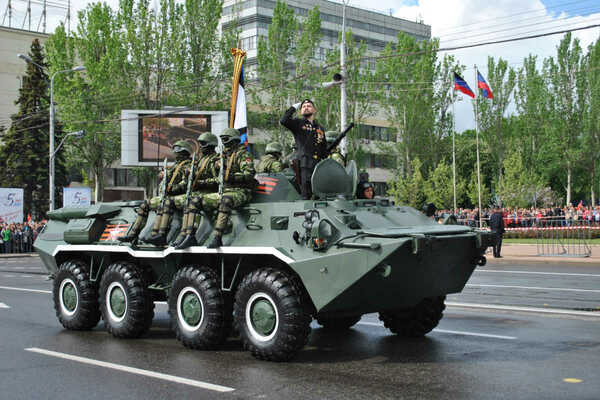
This past spring, the Donbass War between Ukraine and Russian-backed separatists experienced a striking, albeit brief, escalation that threatened to boil over into a full-fledged, interstate war. In late March 2021, the Russian military relocated large numbers of troops to its western border with Ukraine, vowing to defend ethnic Russians in Donbass. Simultaneously, European leaders and U.S. President Biden offered “unwavering support for Ukraine’s sovereignty and territorial integrity in the face of Russia’s ongoing aggression.”
Thankfully, in late April, the Russian defense minister ordered troops back to their bases, away from the border, and the situation has since de-escalated. This most recent incident, and the broader Ukraine crisis ongoing since 2014, has sparked debate about Europe’s capacity to address a seemingly resurgent and aggressive Russia, specifically without the assistance of the U.S. Two camps answer this open question in opposing ways: those who argue yes, Europe can defend itself; and those who argue no, it cannot. Finally, there are those, like myself, who question the need for this debate at all.
Those who say “yes” largely belong to a camp of scholars colloquially called “restrainers,” who generally argue in favor of the U.S. pulling back from its security guarantees in Europe. These individuals believe that European countries, faced with a U.S. withdrawal from NATO and the continent in general, would be more than capable of defending themselves and Europe’s eastern border against Russian aggression. Broadly speaking, it is their belief in a pronounced European power advantage over Russia that leads them to this conclusion: the European Union is home to a population of over 500 million people with a combined GDP in excess of $17 trillion while Russia only has a population of 144 million and a GDP of $1.6 trillion.
The fact that power largely rests upon economic performance (specifically wealth) and population size gives the EU a seemingly shocking advantage against Russia. To be clear, currently the average European country only spends 1.5% of its GDP on military expenditures, a luxury afforded by U.S. security guarantees. Meanwhile, Russian military expenses have consistently taken up around 4% of its annual GDP. Yet despite this difference in percentage spending, in absolute terms, European states spend over triple the amount of Russian expenditures. Even a modest 0.5% increase in European security spending would bring the European military budget to around $340 billion while Russia, if it maintained its ~4% spending, would only muster $64 billion. With such stark disparities in both spending and population, scholars in the “yes” camp are more than confident that Europe could defend itself from Russian aggression.

“Engagers” in the opposing camp argue that continued U.S. security guarantees to Europe are necessary for preserving order in the region. They counter restrainers’ optimism with two points. First, they emphasize the “strategic cacophony” presently at play among European countries. Unlike Russia, European countries are not a singular actor; they are a group of actors with different interests and different views on the degree to which Russia presents a threat. The EU as an institution is currently ill-equipped to coordinate European strategic action. As such, European countries lack the ability to act in a unified, strategic manner against Russian aggression. This “strategic cacophony” is a weakness that Russia can exploit to isolate Eastern European countries by capitalizing on the diversity of interests among EU states.
Second, engagers highlight the lack of actual military capacity possessed by European states. The end of the Cold War marked a sharp decrease in European defense capacity as budgets were slashed and weapons systems were allowed to fade into obsolescence without being replaced. While restrainers focus on potential power, i.e. wealth and population, engagers emphasize the explicit military capability of European states. As evidence for their claim, they point to the abysmal performance of European militaries in the 2011 Libyan intervention when the U.S. was forced to provide crucial logistical, intelligence, and command assistance for European forces. Such failures elicit extreme pessimism about Europe’s ability to fight a conventional war, as Russian forces are undoubtedly better trained and equipped for large-scale war than the Libyan belligerents. Engagers do not rule out the possibility that Europe could defend itself against Russia at some point in the future, but they point to the current state of European security capabilities and argue that, without continued U.S. assistance, Europe would surely fall prey to Russian aggression.
Rather than heralding a new era of Russian resurgence, the Crimean crisis and the Donbass War may just be the dying gasps of a mortally wounded great power trying to seize upon any opportunity or advantage it can find.
In short, these two camps paint very different pictures of Europe’s ability to secure itself and defend against a resurgent Russia. On the one hand, the countries of Europe are vastly more wealthy than Russia and possess over triple Russia’s population. On the other hand, the countries of Europe possess diverse strategic interests, making them vulnerable to division by a singular Russian state. Furthermore, there are serious questions about Europe’s ability to wage conventional war at this point in time. While much attention has been given in recent years to Russia’s employment of hybrid tactics, like cyberattacks, such actions have not fundamentally changed the ways in which warfare is conducted nor do they significantly affect the balance of power between states. To the extent that Europe must meet a perceived Russian threat, the emphasis will remain on the conventional balance of power between them. Scholars will continue to debate this question in the coming years, especially as increasing numbers of Americans question the utility of U.S. security guarantees to Europe.
However, one has to wonder if asking the question is necessary at all. The question of whether Europe can defend itself against Russia presupposes that Russia is in fact resurgent and aggressive. There are two problems with this presupposition. The first is the assumption that Russian action, given a U.S. withdrawal from Europe, would be unceasingly aggressive. Yet Russia is not irrationally intent on the maximum expansion of its borders. It knows that the more aggressive it acts, the more likely European countries will unite against it, threatening its own security. The second is the assumption that Russian resurgence is an enduring reality. The Russian economy was badly hit by the Crimean annexation, and its economic situation is not looking any better seven years out. It is dependent on oil and gas exports, both sources of income that will shrink as states increasingly turn to green alternatives. There are serious doubts that Russia’s economy can modernize to adapt to such a reality. Rather than heralding a new era of Russian resurgence, the Crimean crisis and the Donbass War may just be the dying gasps of a mortally wounded great power trying to seize upon any opportunity or advantage it can find. As time marches on, Europeans will have to confront the increasingly likely chance that they will have to provide a larger share of their own security. However, whether Russia will be the largest threat to that security remains to be seen. After all, China seems poised to rise faster and farther than Russia across all power metrics in the twenty-first century, and China’s foray into Europe is only just beginning.
Further recommended reading on the subject
- Barry Posen, Restraint: A New Foundation for U.S. Grand Strategy (Ithaca: Cornell University Press, 2014).
- Stephen Brooks and William Wohlforth, America Abroad: Why the Sole Superpower Should Not Pull Back from the World (New York: Oxford University Press, 2016).
- John Mearsheimer and Stephen Walt, “The Case for Offshore Balancing: A Superior U.S. Grand Strategy,” Foreign Affairs (July/August 2016), https://www.foreignaffairs.com/articles/united-states/2016-06-13/case-offshore-balancing.
About the author

Alec Hahus is a Ph.D. candidate in the Department of Political Science at the University of Notre Dame, a Graduate Fellow with the Notre Dame International Security Center and the Nanovic Institute for European Studies, a Graduate Affiliate of the Kellogg Institute for International Studies, and co-editor of Europe in the World. His dissertation focuses on how security competition among great powers affects financial flows in the global economy. He also conducts research on religion and politics, nationalism, political backlash to globalization, and security studies. He holds an M.A. in political science from the University of Notre Dame, an M.A. in international relations from the University of Chicago, and a B.A. in international studies and history from Centre College.
Originally published by at eitw.nd.edu on September 16, 2021. EITW provides accessible analyses and commentary on Europe’s political, social, and economic relations with the rest of the globe. It is a platform for scholars of Europe to present their ideas in a form that helps bridge the gap between the academy and the general public.